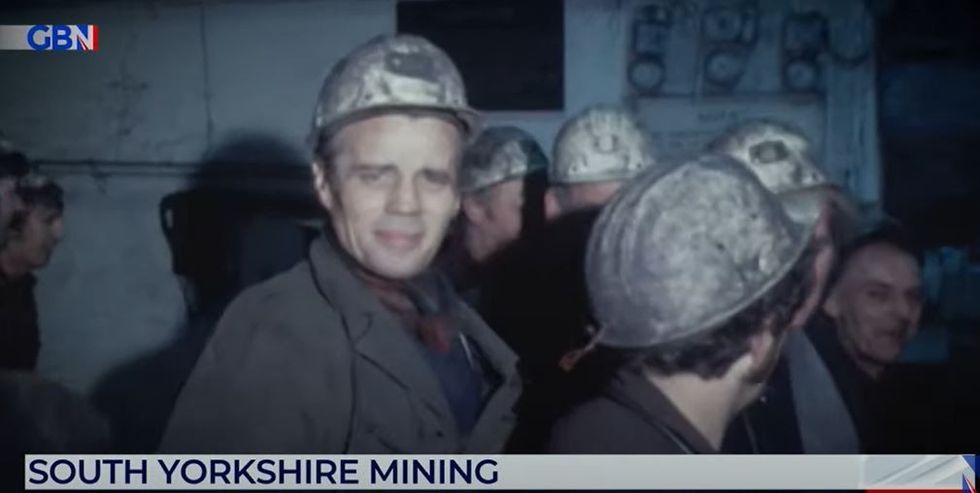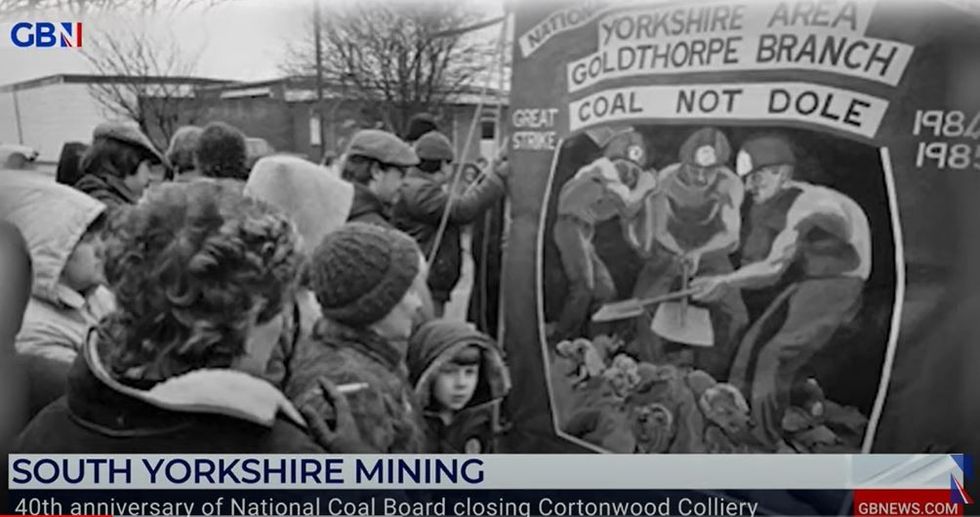‘Drugs all over the place - it’s a s***hole!’ South Yorkshire residents in ‘forgotten’ pit village slam area since mines closed
Residents of South Yorkshire speak out on the loss of the mines
Since the pit shut in 1994, urban decay set in at Goldthorpe with boarded up shops and houses lining streets
Don't Miss
Most Read
Latest
Residents of the ‘forgotten village’ of Goldthorpe in South Yorkshire say that the area has turned to wrack and ruin since its colliery closed 30 years ago – and its problems are getting worse.
Since the pit shut in 1994, urban decay set in at Goldthorpe with boarded up shops and houses lining streets once thriving with trade.
Fly-tipped furniture is now strewn across gardens, windows of homes are smashed and the once booming pub and hotel, The Goldthorpe is an abandoned eyesore set for demolition.
GB News spoke to the people of Goldthorpe who shared their concerns about the once prosperous village.
Graham Porter, a pensioner, has lived in the area all his life. He was out walking his dog and told us: “When the pits were open, it was nice and clean, there were no drugs.
“Since the pits have shut, it’s just gone downhill. There are drugs all over the place, you never see any council workers around here cleaning it up or anything.
“I want to move but house prices are stopping me. If I sold my house, I’d get next to nothing for it because of the area, I’d be near enough giving it away.
“I’d like to see the area cleaned up, there’s fly-tipping all over the place and they need to get rid of all the druggies. I’m disgusted with the area really, it’s a s***hole.”
Last week, South Yorkshire Police arrested a 27-year-old man on suspicion of murder after a 27-year-old man was stabbed to death at a house in Cooperative Street in Goldthorpe, with the killing sending shockwaves through the community.
Mum of three Shelby Burnett told GB News about it and said: “Over the last year, it’s started getting really bad with the crime.
“We’ve had a murder the other week, I wouldn’t say it’s a great place at the moment to be bringing kids up. It’s got really bad around here at the minute.”
Grandmother Cheryl Hand fears taking her grandchildren to school in Goldthorpe due to the level of crime in the area.
She said: “When I was younger, everybody knew everybody, we were safe on the street. We’d got all our banks and stuff like that. It’s just gone from that to zero. There are murders on your front street. You daredn’t go out, it’s dangerous.
“It makes me feel like I want to move somewhere different even though I’ve grown up here all my life, it’s horrible.
“It’s going derelict, all you’ve got is hairdressers and takeaways, that’s it.”

Shelley Burnett, Goldthorpe local
GB News
Despite many shops and amenities closing, businesses are still open in the area.
Dave Jarvis is the owner of Corner Tap, a pub in Goldthorpe, which he has been running since 2020. He thinks that Goldthorpe is a ‘forgotten village’.
“When the pits closed, the government never had a backup strategy for employment in this area, so everybody went from earning good money, regular money, to nothing,” he said.
“There were a lot more pubs and things to do in Goldthorpe when I was a lad, but pubs are shut, and you see a lot of shops boarded up. Usually, you knew everyone on your street but now they’re all strangers.
“We have our ups and downs now as any business does – time of year, weather, the end of the month when nobody has any money, but we’re doing well, I can’t complain.”
It was on March 1st in 1984 the National Coal Board unexpectedly announced the closure of Cortonwood Colliery in South Yorkshire.
Four days later the Cortonwood miners walked out on strike. This nationwide strike spread rapidly through the coal fields, polarised the country, and was one of the most significant industrial disputes of the 20th century.
John Greaves, 70, downed tools at Goldthorpe Colliery as part of the strike action and says the eventual close of the pit left a heart-breaking legacy in the former mining community.
Reflecting on this, he told GB News: “Goldthorpe was vibrant at five o’clock in the morning, shops were busy, it was alive. Once the pit closed, they opened the bypass and what happened was all the passing traffic didn’t pass anymore.
“It took them more than 12 months to put up a sign that said ‘Goldthorpe’, so Goldthorpe in effect was cut off in days and we lost a lot of trade. People moved away and there was a lot of despondency and it’s just spiralled into a mess.

South Yorkshire mining was a bustling industry
GB News

40th anniversary of the mines closing in South Yorkshire
GB NEws
“I never thought I’d see shops with peeling paint, shops boarded up or with shutters down.
“When the pit was open, there was very little crime. No sooner had the pit closed we got graffiti and we got a drug problems. Urban decay is a good description for it.”
Its nearly 40 years on since the miners strikes began and millions of people are still reeling from its effects.
In 1983 there were over 170 pits, employing 187,000, with the largest concentration of pits and miners in Yorkshire, Nottinghamshire, and South Wales. At its peak, at least 142,000 miners were on strike.
“12 months on strike with no money, yes, it’s hard. We coped, did a bit of part time work, and we managed,” said former miner John Greaves.
“Families split up because some brothers went back to work and there were all the bad things that could happen.
“But on a lighter note, it freed a lot of women who had been, I hate to hear myself say it, but tied to the kitchen sink, they were almost domestic slaves.
“But all of a sudden they got their voice, a lot of them grew, they went to university and went on to decent jobs.”
John was devastated when production stopped at Goldthorpe Colliery in February 1994. He was in his 40s and had worked there since he left school.
“I thought my world had come to an end. I cried on the way home. I couldn’t see a future, not that I was putting myself in any risk, but I just thought ‘I don’t know what I’m going to do’, he told GB News.
I’d done a lot of things in the pit and it just seemed so alien to move out of that environment that I was so comfortable with. I loved every minute of it. The conditions were awful, but I really didn’t know anything else. I just thought it was amazing. The camaraderie was second to none.
“The joshing or joking with one another happened all the time and the sense of humour levels went sky high. If you were a serious person, it was the wrong place to be.”
Film-makers Rebecca and Dean Sills have produced the award-winning film ‘Regeneration’ to chronicle South Yorkshire’s mining history to tie in with the 40th anniversary of the strike action led by Arthur Scargill, President of the National Union of Mineworkers.
Speaking to GB News at Manvers Lake, formerly Wath Colliery in Rotherham, Rebecca Sills, 25 and Film-maker said: “Most of my family were miners, my grandads were miners and my great granddads were miners, so it’s like a memory film really.”
This was echoed by Dean Sills, 55 and Actor and Film-maker, who added: “We’ve got to remember it, because it was an older generation, like our Rebecca doesn’t have a clue what this area was like when there were pits here.
“It looks totally different. There’s a lot of areas that are run down, but then you’ve got beautiful areas like where we are today.”
The film Regeneration by father and daughter Dean and Rebecca Sills can be purchased here - https://amzn.eu/d/70Z40Ay













